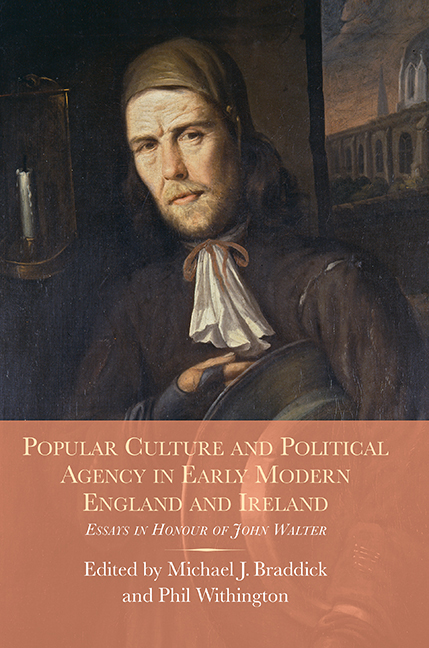 Popular Culture and Political Agency in Early Modern England and Ireland
Popular Culture and Political Agency in Early Modern England and Ireland Book contents
- Frontmatter
- Contents
- List of Illustrations
- List of Contributors
- Acknowledgements
- List of Abbreviations
- Introduction
- 1 John Walter and the social history of early modern England
- 2 Contrasting susceptibility to famine in early fourteenth- and late sixteenth-century England: the significance of late medieval rural social structural and village governmental changes
- 3 The politics of English political economy in the 1620s
- 4 Provision, household management and the moral authority of wives and mothers in early modern England
- 5 Popular senses of past time: dating events in the North Country, 1615–1631
- 6 Spectral lordship, popular memory and the boggart of Towneley Hall
- 7 Self-image and public image in the career of a Jacobean magistrate: Sir John Newdigate in the Court of Star Chamber
- 8 Gender, agency and religious change in early Stuart England
- 9 ‘A Standard which can never fail us’: the Golden Rule and the construction of a public transcript in early modern England
- 10 Religion, anti-popery and corruption
- 11 An ‘Aristotelian moment’: democracy in early modern England
- 12 John Lilburne and political agency in revolutionary England
- 13 An Irish Protestation? Oaths and the Confederation of Kilkenny
- 14 ‘Whereat his wife tooke great greef & died’: dying of sorrow and killing in anger in seventeenth-century Ireland
- Bibliography for John Walter
- Index
- Tabula Gratulatoria
- Miscellaneous Endmatter
12 - John Lilburne and political agency in revolutionary England
Published online by Cambridge University Press: 09 May 2017
- Frontmatter
- Contents
- List of Illustrations
- List of Contributors
- Acknowledgements
- List of Abbreviations
- Introduction
- 1 John Walter and the social history of early modern England
- 2 Contrasting susceptibility to famine in early fourteenth- and late sixteenth-century England: the significance of late medieval rural social structural and village governmental changes
- 3 The politics of English political economy in the 1620s
- 4 Provision, household management and the moral authority of wives and mothers in early modern England
- 5 Popular senses of past time: dating events in the North Country, 1615–1631
- 6 Spectral lordship, popular memory and the boggart of Towneley Hall
- 7 Self-image and public image in the career of a Jacobean magistrate: Sir John Newdigate in the Court of Star Chamber
- 8 Gender, agency and religious change in early Stuart England
- 9 ‘A Standard which can never fail us’: the Golden Rule and the construction of a public transcript in early modern England
- 10 Religion, anti-popery and corruption
- 11 An ‘Aristotelian moment’: democracy in early modern England
- 12 John Lilburne and political agency in revolutionary England
- 13 An Irish Protestation? Oaths and the Confederation of Kilkenny
- 14 ‘Whereat his wife tooke great greef & died’: dying of sorrow and killing in anger in seventeenth-century Ireland
- Bibliography for John Walter
- Index
- Tabula Gratulatoria
- Miscellaneous Endmatter
Summary
Two themes central to John Walter's work on popular politics have been the analysis of practical measures of organisation, tactics and mobilisation, and of the legitimating languages which could be appropriated and deployed in support of popular action. This chapter considers John Lilburne's public career in order to explore how the possibilities for this kind of action were extended during the Revolution, as John Walter has done in his more recent work. Lilburne himself was not, of course, of the lower orders, and would certainly have resented the suggestion. But he was deeply involved in forms of political mobilisation which did offer opportunities for those normally excluded from political power to exercise political influence. By exploring how Lilburne sought to achieve political agency, and what that might tell us about the English Revolution, this chapter aims to throw light on broader changes in English political culture in the mid seventeenth-century crisis.
Lilburne was undoubtedly a significant public figure and, although he was clearly not a ‘plebeian’, his political role did not derive from conventional sources. One of the Lincolnshire fenlanders who took him on as their advocate in the early 1650s said they had done so because he ‘was a powerful man & having friends would give a sooner end to the business’. He was certainly by then someone with a high profile: he had stood trial for his life in 1649 and would again in 1653, and both trials were interpreted as tests of the legitimacy of the regime, the latter indeed as a trial of strength between him and Cromwell. He did not hold any public office, however, and was not by birth or background a natural member of the national political elite. He was the younger son of a gentleman, apprenticed into the cloth trade and at other stages in his life was able to enter highly capitalised trades, first brewing with the support of his family and then soap-boiling, but he never established for himself a trade or landed estate and never held public office. After his death, his wife was forced to petition for continued payment of a state pension. His political profile was not therefore achieved by the established means – of secure gentry, professional, trade or merchant status, or through public office. Instead, it arose by virtue of his mastery of the techniques of political mobilisation.
- Type
- Chapter
- Information
- Popular Culture and Political Agency in Early Modern England and IrelandEssays in Honour of John Walter, pp. 223 - 242Publisher: Boydell & BrewerPrint publication year: 2017
